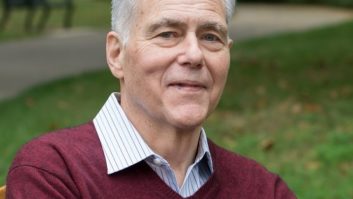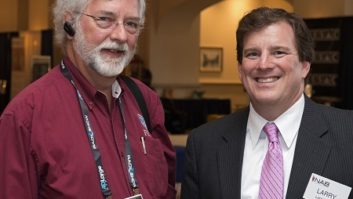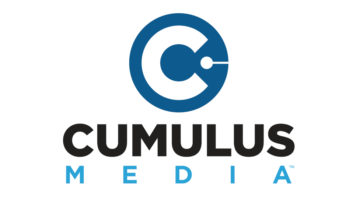Seeing a way to strengthen engineering resources while keeping costs down, Cumulus Media and Gap Broadcasting have begun sharing engineers in four markets. If the arrangement works, they may extend it beyond those areas, according to executives at the radio groups.
Cumulus Vice President of Engineering & IT Gary Kline and Gap Broadcasting Vice President of Engineering Norm Philips — as well as their bosses — had been discussing such an arrangement. The companies finalized the deal in June for the Texas markets of Amarillo, Midland-Odessa and Abilene, as well as Shreveport, La.
Four engineers, two from each company, are part of the agreement so far.
Several weeks of discussions went into the deal, which is working out well to date, according to Kline and Philips. “Typically we hear about the complaints when something isn’t working,” said Kline, but there have been none from the engineering, programming or sales staffs of the affected stations.

Jasen Bragg, DOE and IT director for Cumulus Media of Shreveport, works on a switch at a Gap facility. “Norm and I agreed when the deal was done, if something needed to be adjusted, we could change it. We’re going to make this work.”
Gap Broadcasting and its sister division Gap West are subsidiaries of Gap Holdings, which is controlled by funds managed by private investment firm Oaktree Capital Management. Gap Broadcasting owns 60 radio stations in 12 markets; Gap West has 56 stations in a dozen markets. In June, the company formed another division, GAP East, to focus on acquiring and managing radio properties in markets east of the Mississippi River.
Cumulus Media is a publicly traded company based in Atlanta. It controls approximately 350 radio stations in 68 markets.
The arrangement essentially takes work that had been done by one or more contract engineers in each of the four markets and moves it to a full-time employee of the respective partner company. Two Cumulus contract engineers were replaced by full-time Gap engineers. Gap and Cumulus share their time.
One Gap engineer in one market was let go; Philips said the company is looking to hire a couple of engineers in other markets. Kline added: “It is our goal to do our best to keep our competent and trustworthy engineers’ employed within the company. It is entirely possible that an engineer from outside the company could be hired as part of the sharing program.”
The companies said that before the deal was reached, they studied whether they could accomplish the sharing, retain engineers and not burn them out. Aspects such as compensation and station proximity were discussed.
They looked for markets within a two- or three-hour drive of other Gap or Cumulus clusters, so an affected engineer could count on engineering help if needed.
“Say a transmitter goes off the air and this guy is the only engineer for both clusters,” said Kline. Under the plan, theoretically that engineer can bring in engineers from more markets than he would have been able to otherwise.
Compensation for extra work
“Once we found a way to make it happen without many additional hours on the engineers, we worked out the plan. There is cost savings for both companies without losing services,” said Philips, who says the affected Gap engineers are getting a bonus for the work. They’re not being asked to work more hours, though that may happen from time to time, he notes.
Kline says the arrangement helps him attract good engineers because Cumulus is sharing the cost with another company. Cumulus has to pay Gap for its engineers and vice versa to account for the different compensation systems within each company and different number of studios in each market. The agreement also covers compensation if one company has older equipment than another in a market, which may necessitate more time for upkeep.
Cumulus engineers who work for Gap received a package modification, according to Kline, in the form of a bonus or commission.
Neither Kline nor Philips would provide financial specifics about the agreement such as the cost-savings for each company or how much the affected engineers would earn.
There are set days that the engineers are scheduled to work for each company, but that is flexible depending on need. The week Philips spoke to Radio World, he said the Cumulus engineer in Shreveport was having a transmitter issue. It was a “Gap day” but the engineer worked on the Cumulus transmitter.
“I talked him through a couple things to look at and offered to meet him at the site later if needed, since I [was] driving to Shreveport anyway,” said Philips. “We had a similar off-air issue the first week of the agreement in Abilene and the Cumulus engineer was working on a Gap transmitter on a Cumulus day.”
The four engineers involved retain their seniority and benefits with their respective employers. Each reports to his or her market manager, who is the point of contact with the other company.
Program may expand
The companies have discussed expanding the agreement and are open to it if it makes sense, according to Kline and Philips. How many stations in a market an engineer would need to cover is key, as is proximity to other Cumulus or Gap markets, they said.
The numbers worked out, for example, in Shreveport, where Gap has six stations, four FMs and two AMs. Cumulus has five total stations in the market, four FMs and one AM.

In Texas, Midland-Odessa engineer Rodney Norris of Gap is shown at the transmitter facility of Cumulus-owned KBAT(FM). Asked whether the arrangement is a way for both companies to do more work with fewer engineers, Kline said, “I can understand why someone would think that, but that’s not what this is about. It’s about retaining engineers with decent compensation plans and good tools for the job.
“You might think [a situation with] an engineer who had five stations, and now has 11, is horrifying. It’s not,” Kline explained, because engineers now can draw from two companies instead of one in times of need, for instance, and will have more test equipment to share.
“You’re alone day to day, typically, but if something goes wrong, you’ve got people who can help,” said Kline.
Cumulus does some sharing internally now, he said. For example, the chief engineer in Cedar Rapids, Iowa is also the CE in Waterloo. The company has the same CE covering stations in Green Bay and Appleton, Wis. and one CE covering all the stations in Oxnard and nearby Santa Barbara, Calif.
The program also is a way for participating engineers to gain more responsibility and management experience, in addition to gaining more experience with consoles, wiring systems and other equipment — keys to becoming a regional engineering manager at Cumulus, according to Kline.
“In each market, you want to consider who has the broadest experience and the right maturity level,” said Kline. “Who is the best candidate for this job? Is this person responsible? You want the other station to say: ‘I’m glad this person is doing this job.’”
They say their companies keep the lines of communication open.
“In all the markets I am familiar with the engineers have worked behind the scenes to help out engineers [from other companies] in times of off-air situations, said Philips. “This is an extension of that concept on a daily basis.”
Comment on this or any story. Write to[email protected]with Letter to the Editor in the subject line.








